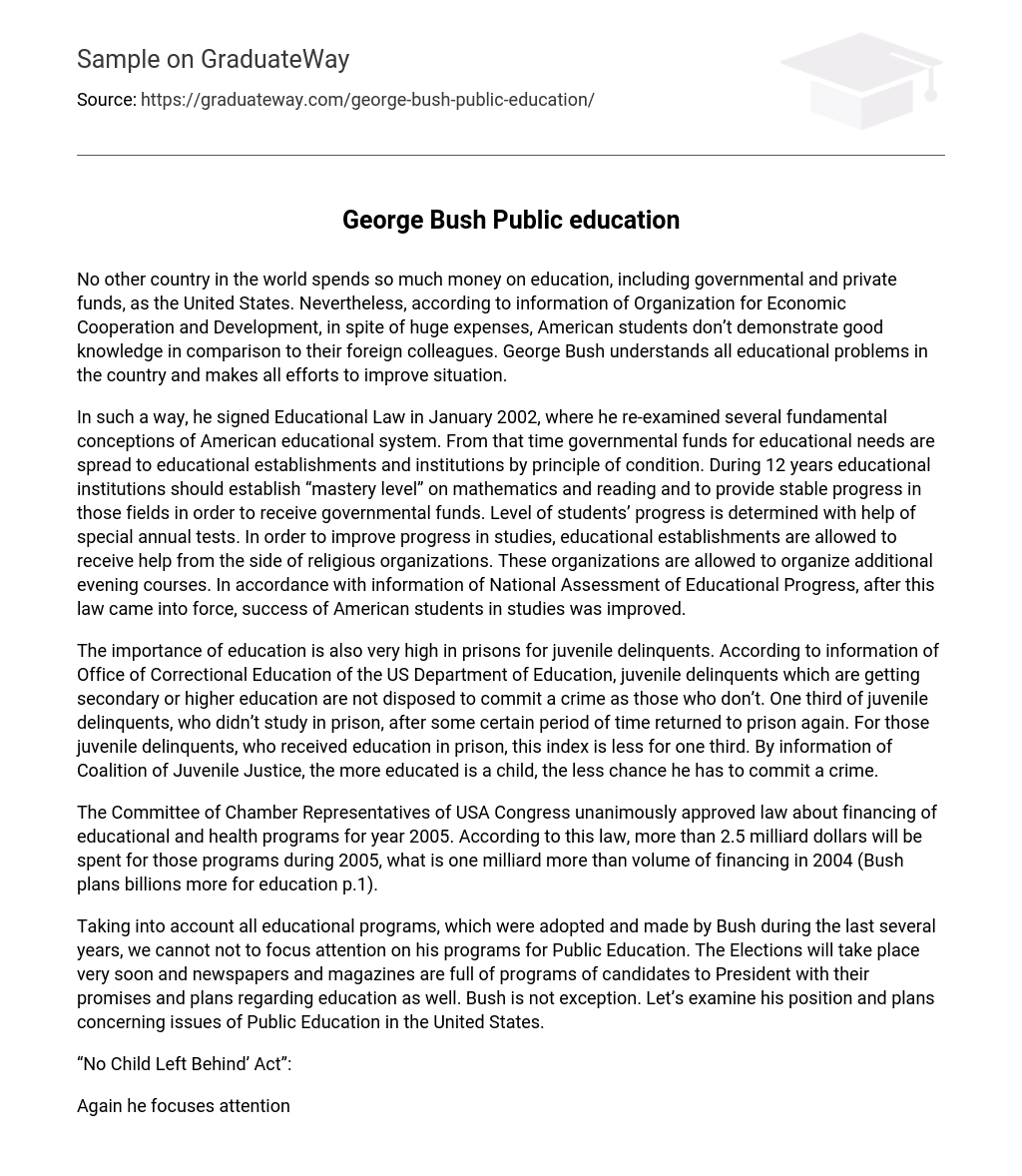No other country in the world spends so much money on education, including governmental and private funds, as the United States. Nevertheless, according to information of Organization for Economic Cooperation and Development, in spite of huge expenses, American students don’t demonstrate good knowledge in comparison to their foreign colleagues. George Bush understands all educational problems in the country and makes all efforts to improve situation.
In such a way, he signed Educational Law in January 2002, where he re-examined several fundamental conceptions of American educational system. From that time governmental funds for educational needs are spread to educational establishments and institutions by principle of condition. During 12 years educational institutions should establish “mastery level” on mathematics and reading and to provide stable progress in those fields in order to receive governmental funds. Level of students’ progress is determined with help of special annual tests. In order to improve progress in studies, educational establishments are allowed to receive help from the side of religious organizations. These organizations are allowed to organize additional evening courses. In accordance with information of National Assessment of Educational Progress, after this law came into force, success of American students in studies was improved.
The importance of education is also very high in prisons for juvenile delinquents. According to information of Office of Correctional Education of the US Department of Education, juvenile delinquents which are getting secondary or higher education are not disposed to commit a crime as those who don’t. One third of juvenile delinquents, who didn’t study in prison, after some certain period of time returned to prison again. For those juvenile delinquents, who received education in prison, this index is less for one third. By information of Coalition of Juvenile Justice, the more educated is a child, the less chance he has to commit a crime.
The Committee of Chamber Representatives of USA Congress unanimously approved law about financing of educational and health programs for year 2005. According to this law, more than 2.5 milliard dollars will be spent for those programs during 2005, what is one milliard more than volume of financing in 2004 (Bush plans billions more for education p.1).
Taking into account all educational programs, which were adopted and made by Bush during the last several years, we cannot not to focus attention on his programs for Public Education. The Elections will take place very soon and newspapers and magazines are full of programs of candidates to President with their promises and plans regarding education as well. Bush is not exception. Let’s examine his position and plans concerning issues of Public Education in the United States.
“No Child Left Behind’ Act”:
Again he focuses attention at his well-known “No Child Left Behind’ Act” – we spoke about this issue already, still let’s underline that students, according to that law, should pass special standardized tests in order to see the progress in studies. Administration of Bush notices, that the President is “investing more resources in America’s students than at any time in history.” (In Depth: Bush vs Kerry in Education p.1)
Educational Voucher:
In accordance with Bush’s plans, school which doesn’t execute its tasks properly, it means, the school which gives bad education, is given three years of trial period. In case during that period of time school didn’t solve its problems, parents receive educational voucher for amount of education of a child in public school (it is approximately 5-7 thousand dollars) and can send him to private educational establishment.
Bush’s Additional Plans:
His Administration program is a kind of attempt to be sure that every child will learn to read at least by third grade. His First Reading Programs are spread all over America and his plans are to continue financing in this field.
He also plans to donate 583 million dollars to make a new fund for job training and educational programs in order to improve high school education.
Bush proposes also to establish a fund to provide grants to 20,000 students with low level of income for studying science and mathematics. These proposals are made to support position of America and American citizens as the world leader in innovative economy (In Depth: Bush vs Kerry in Education p.1).
Bush believes that every child deserves to get a first-rate public education and makes all efforts to realize all kinds of educational programs and programs of financing talented and gifted students, as well as students with low income.
He continues his politics in providing of Healthy Start, Grow Smart program for small children’s education (A Bold New Direction in Education Reform p.1). His plans to improve early childhood education processes include programs which prepare small children to the school and give certain pre-school knowledge, which will make school education easier; literacy promotion to train parents in early literacy with help of Head Start; encouragement and continuation of fund research which will create more effective programs for small children’s education; issuing different kinds of information, booklets and books in order to teach parents all they need to prepare their child to school; creation and maintenance of organizations which will provide parents with necessary skills for early education of their children, etc (A Plan for Creating Opportunity for America’s Workers, Ch. 1).
Works Cited:
1. In Depth: Bush vs Kerry in Education [online] http://www.youthnoise.com/page.php?page_id=1716
2. A Bold New Direction in Education Reform [online] http://www.georgewbush.com/Education/
3. A Plan for Creating Opportunity for America’s Workers, Chapter 1 [online] http://www.georgewbush.com/Agenda/Chapter.aspx?ID=1#ed
4. Bush plans billions more for education, By Wire services
Published January 9, 2004 [online] http://www.sptimes.com/2004/01/09/Worldandnation/Bush_plans_billions_m.shtml





